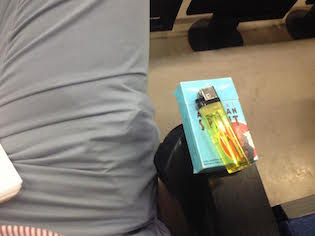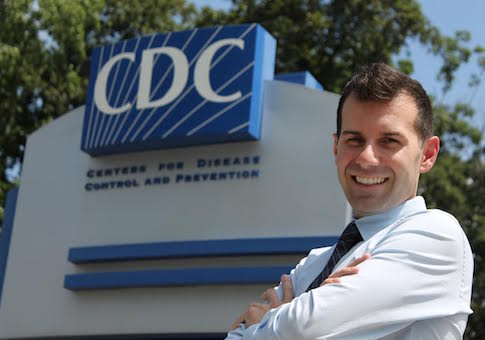Dr. Brian King, the deputy director for research translation in the Office on Smoking and Health at the National Center for Chronic Disease Prevention and Health Promotion, has a job that I don’t think should exist. He is very good at it.
King spoke about tobacco and e-cigarettes to an auditorium full of medical students, professors, and academic bureaucrats at George Washington University on Wednesday. After half an hour of generic TV-style smooth jazz covers of Motown songs for those of us who showed up at the posted time of 4:00 p.m., a woman named Kimberly introduced him.
"How is everyone?" asked Kimberly. "I hope you’ve had a fun and thought-provoking day." On the screen behind her was a message for students: "To receive Professional Enhancement Activity credit, you must email your name and SPH program to GWSPHResearch@gwu.edu during the presentation."
Kimberly told us about what a pleasure it has been for her to know "Brian"—she was doing that thing upper-middle-class liberals do with first names to remind you just how powerfuless you and your jerkwater formality are—in recent years, and how much she enjoyed his last presentation at GW. "I found his style and his perspective very compelling. Dr. King is memorable."

After she and the memorable doctor switched places, King began by joking with us about all the "hate mail and death threats" he has received in the course of his work. It was hard not to think that he was fibbing.
He started his talk with some statistics about the rising popularity of e-cigarettes, or, as he calls them, ENDS (electronic nicotine delivery systems)."In Oklahoma there are more vape shops per capita than Sonic, or Starbucks, depending on who you’re talking to," he said, his voice whiny and energetic, like an effeminate villain’s in a cartoon show, dripping with contempt for anyone who might have ever considered ordering a SuperSonic Bacon Double.
Then we were treated to a bunch of PowerPoint slides. My favorite featured a little note at the bottom saying the percentages on the graphs would not add up "due to rounding." I would be lying if I said that I didn’t learn a few things. For example, with real cigarettes there are two different kinds of second-hand smoke—"mainstream" and "side-stream"—while with vaping devices there is only one. Also, according to surveys, nearly 2.5 million high-school students have at least tried e-cigs, something King chalked up to the abundance of flavors and online advertising. "People say whatever they want on the Internet. This is problematic."
King kept me on my toes. "We have oodles and oodles of evidence documenting potential adverse effects of nicotine among vulnerable populations, particularly pregnant women and fetuses, and there is an emerging body of evidence on the developing adolescent brain. Nicotine is toxic to developing fetuses." He left me with a lot of questions. Is it fair to characterize the quantity of your findings as "oodles" if you’re still not even sure the data shows what you hope it does? Are those "adverse effects" only "potential" or not? Is abortion okay, but smoking while pregnant not?
I felt justified in my suspicions when Dr. King told us that "A lot of this science is based on animal models," adding that it was impossible directly to test, say, the effects of nicotine use on adolescent brains. "It’s not happening because it’s unethical because we know it’s bad." Why bother testing it at all if you already know it’s bad?
I quickly got the sense that Dr. King has never been a smoker. He didn’t seem to understand why people who still smoke, as opposed to those trying to quit, use e-cigs, something that is blindingly obvious to anyone whose fingers reek of nicotine—namely, that we use them in airport bathrooms and on Amtrak and in offices when we’re too lazy to go outside. It was strange, too, to see the look of disgust on his face whenever he showed us old pictures of Humphrey Bogart and Lucille Ball smoking. Is he really immune to the charm of old Ronald Reagan Chesterfield ads? Even the sinister-looking blue smoke background on his PowerPoint was appealing to me.
The main takeaway of his presentation, he told us, was that e-cigarettes might under certain conditions be safer than cigarettes. "Anything is less harmful than combustible tobacco products."
At the end of the talk a handful of students were given time for questions. One kid asked King to look at the abstract of a paper he wrote. A girl gave a one-minute speech about Millennials—a word she used at least 10 times—and hookah bars. How do we show them that hookah is bad too? Here King acknowledged a certain difficulty. "Making sure we message on just the science is tricky," he said. "But we’ve done our best to ensure that children are absolutely horrified at the thought of cigarette smoke."
After the last question Kimberly pulled out a gold gift bag.
"We have a small federally appropriate gift for you," she said.
I needed to smoke.
